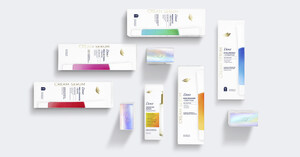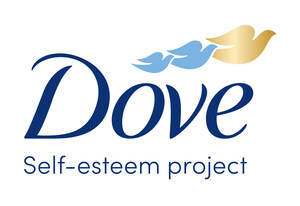New Dove Research Finds Beauty Pressures Up, and Women and Girls Calling for Change
LONDON, June 21, 2016 /PRNewswire/ --
- Dove launches its largest-ever study to understand women and girls around the world like never before
- Low beauty confidence and appearance anxiety a critical issue
- Women around the world desire a new beauty definition
- Dove Self-Esteem Project increases global commitment to help more young people reach their full potential
Despite rising levels of beauty and appearance anxiety, more women and girls are fighting back against unrealistic beauty pressures, says a new global report released today by Dove.
The Dove Global Beauty and Confidence Report, which interviewed 10,500 females across 13 countries, found that women's confidence in their bodies is on a steady decline, with low body esteem becoming a unifying challenge shared by women and girls around the world - regardless of age or geography.
Despite this, there is still a strong desire among females to challenge existing beauty norms, with 71% of women and 67% of girls calling for the media to do a better job portraying women of diverse physical appearance, age, race, shape and size.
The report is the third and most comprehensive study Dove has undertaken on the topic, building on two previous studies published in 2004 and 2010. It reveals the impact low body esteem has on a woman's ability to realise her potential, with nearly all women (85%) and girls (79%) saying they opt out of important life activities - such as trying out for a team or club, and engaging with family or loved ones - when they don't feel good about the way they look.
Additionally, 7 in 10 girls with low body-esteem say they won't be assertive in their opinion or stick to their decision if they aren't happy with the way they look, while 9 out of 10 (87%) women will stop themselves from eating or will otherwise put their health at risk.
"This latest research shows that low body confidence is a global issue," says Dr. Nancy Etcoff, Assistant Clinical Professor Harvard Medical School, Director of Program in Aesthetics and Wellbeing, MGH Department of Psychiatry. "Though troubling, these results are also unsurprising, given the increasing pressures women and girls face today. We need to help empower women and girls in many ways, including increasing body-confidence education, driving meaningful conversations around the pressures women and girls face, and advocating for change in how females and their appearance are talked about and portrayed in the media."
Women (69%) and girls (65%) cite increasing pressures from advertising and media to reach an unrealistic standard of beauty as a key force in driving appearance anxiety, while 56% of all women recognise the impact of an 'always on' social media culture in driving the pressure for perfection. Perhaps most worryingly, nearly 8 in 10 (78%) of both women and girls feel some pressure to never make mistakes or show weakness.
The report found that beauty and appearance anxiety is a global issue, but one that women are experiencing differently by culture and country - it allowed for a closer look at the nuanced and changing definitions of beauty defining and uniting women all over the world.
Traditionalists (China, India, South The Modernists (US, Canada, Germany,
Africa and Turkey) UK and Australia)
The lives of Traditionalists are While their public and private lives
rooted in religious and social are governed by high standards of
conventions, with girls feeling equality and freedom, Modernists face
strong pressure to follow in their increasing tension to 'be it all' and
mother's footsteps. They are 'have it all'. This cultural group
experiencing a unique tension as more may be more aware of the media
young women start to challenge pressures they face, but are also
traditional attitudes and beauty experiencing lower levels of
standards. Interestingly, women and confidence. This is best evidenced in
girls in this cultural group have the US, where only 50% of women feel
higher levels of confidence in their confident in their own beauty -
own beauty than some modernist falling from 85% in 2010.
cultures, particularly in India where
96% of women report feeling confident
in their beauty - the highest across
all countries.
The Dualists (Mexico, Brazil and The Ritualists (Japan)
Russia)
Dualists lead multi-layered and Speaking specifically about Japan,
conflicting lives. Publically, they Ritualists remain focused on meeting
are encouraged to be educated and cultural demands - success and
career focused. Privately, they are progress often depend on being seen
expected to fill traditional roles to do the 'right thing'. High value
of carers, wives and homemakers. is also placed on looks, however
Confidence fluctuates as women and Ritualists also feel the least amount
girls flex between embracing more of pressures than other countries.
modern roles vs. traditional roles.
It's not all bad news for women and girls. The report uncovers a unique tension, with 60% of women believing they need to meet certain beauty standards, while at the same time, 77% agreeing it is important to be their own person and not copy anyone else.
Even more telling is the belief expressed by the majority of women (83%) and girls (77%) who say they want to look their personal best rather than follow someone else's definition of 'beautiful', and 83% of all women and 82% of girls who agree every woman has something about them that is beautiful.
For many women and girls, the key to breaking a cycle of beauty and appearance anxiety seems to be the experience of taking time to care for their minds, body and appearance. In fact, 7 in 10 women and 8 in 10 girls report feeling more confident or positive when they invest time in caring for themselves.
"Taking time for care - whether it's body or mind - is an important step in improving the confidence of women and girls," says Victoria Sjardin, Senior Global Director, Dove Masterbrand. "For over 50 years, Dove has been committed to creating a world where beauty is a source of confidence, not anxiety. With this new research, we hope to inspire women and girls everywhere to develop a positive relationship with the way they look."
Dove has long used real women in all its advertising and marketing campaigns, and has adhered to a strict no airbrushing policy. With the Dove Self-Esteem Project, launched in 2004, Dove has positively impacted the lives of more than 19 million young people across 128 countries through self-esteem education and training.
To coincide with the launch of The Dove Global Beauty and Confidence Report, the brand recently announced a new goal of doubling its social impact by 2020 - committing to positively impacting an additional 20 million young lives over the next four years.
A full copy of the report is available upon request by emailing [email protected]. For more information on Dove and the Dove Self-Esteem Project, go to selfesteem.dove.com.
NOTES TO EDITORS
Survey Methodology
The research used in the report was conducted by Edelman Intelligence, a specialist applied research firm based in London.
The study was conducted in two phases with the first phase taking place in late 2015 with 7 countries. The study was then further broadened with another 6 countries at the beginning of 2016. In total, Edelman Intelligence interviewed 6000 women aged 18 to 64 and 4500 girls aged 10 to 17 in thirteen countries: India, the US, UK, Brazil, China, Japan, Turkey, Canada, Germany, Russia, Mexico, South Africa, Australia.
These countries were selected in order to adequately represent the diversity of women and girls in terms of culture, beliefs, social pressure and economic development as well as a fair representation of the diversity of culture and tradition around beauty. The sample was broadly representative of women / girls population in each country in terms of age, region and social grade.
All respondents answered a 30 minute survey of 40 to 50 questions. All markets excluding India and South Africa were asked these questions via an online quantitative survey. Interviews in India and South Africa were conducted face to face in order to get a national representation of the market due to their low online penetration in the market.
All interviews were conducted in each market's local languages. To ensure the cultural robustness of this research, we ensured the translations in local languages were accurate and the wording was comprehensible for the younger girls interviewed. Thus, each translation has been conducted and reviewed by two different translation experts, native to each country and piloted amongst younger girls to ensure the questions were clear to them.
The study also hosts a number of tested, historical, academic scaled questions which ensured a level of understanding which is unprecedented and new to the industry. These questions looked to unlock women and girls body confidence, levels of self-esteem and appreciation for their own body.
About Dove
Dove®, manufactured by Unilever, is the No. 1 personal wash brand nationwide. One in every three households uses a Dove® product, which includes beauty bars, body washes, face care, anti-perspirant/deodorants, body mists, hair care, styling aids and Dove® Men+Care™, developed specially for men. Dove® is available nationwide in food, drug and mass outlet stores.
About the Dove Self-Esteem Project
Dove has a long-standing commitment to creating a world where beauty is a source of confidence, and not anxiety. The Dove Self-Esteem Project (2004), helps the women of tomorrow develop a positive relationship with the way they look, raise their self-esteem and realise their full potential.
So far, we've reached the lives of more than 19 million young people across 138 countries, making the Dove Self-Esteem Project one of the largest providers of body confidence education in the world. selfesteem.dove.com
About Unilever
Unilever is one of the world's leading suppliers of Food, Home and Personal Care products with sales in over 190 countries and reaching 2 billion consumers on any given day. It has 174,000 employees and generated annual sales of €49.8 billion in 2013. Over half of the company's footprint is in the faster growing developing and emerging markets (57% in 2013). Their portfolio includes Persil, Dove, Knorr, Domestos, Hellmann's, Lipton, Wall's ice cream, Marmite, Magnum and Lynx.
Unilever's Sustainable Living Plan (USLP) aims to double the size of the business whilst reducing environmental footprint and increasing positive social impact. It says the USLP is their strategic response to the challenges businesses face operating in an uncertain and volatile world. Its three goals are:
- Helping more than a billion people take action to improve their health and well-being
- Sourcing all their agricultural raw materials sustainably by 2020
- And decoupling their growth from their environmental impact
Supporting these goals, the company has defined nine commitments, underpinned by targets encompassing social, environmental and economic areas. For more information about the Unilever Sustainable Living Plan at http://www.unilever.com/sustainable-living/.
Unilever was ranked number one in their sector in the 2014 Dow Jones Sustainability Index. In the FTSE4Good Index Series, they attained a top environmental score of 5, leading to inclusion in the FTSE4Good Environmental Leaders Europe 40 Index. In 2014 they led the list of Global Corporate Sustainability Leaders in the GlobeScan/SustainAbility annual survey - for the fourth year running. In 2014 Unilever was named in LinkedIn's Top 3 most sought-after employers across all sectors and is also LinkedIn's No. 1 most sought-after FMCG employer worldwide. For more information about Unilever and its brands, please visit www.unilever.com.
Contact info:
Marissa Bushe
Edelman
+44(0)7780803048
SOURCE Dove
WANT YOUR COMPANY'S NEWS FEATURED ON PRNEWSWIRE.COM?
Newsrooms &
Influencers
Digital Media
Outlets
Journalists
Opted In






Share this article